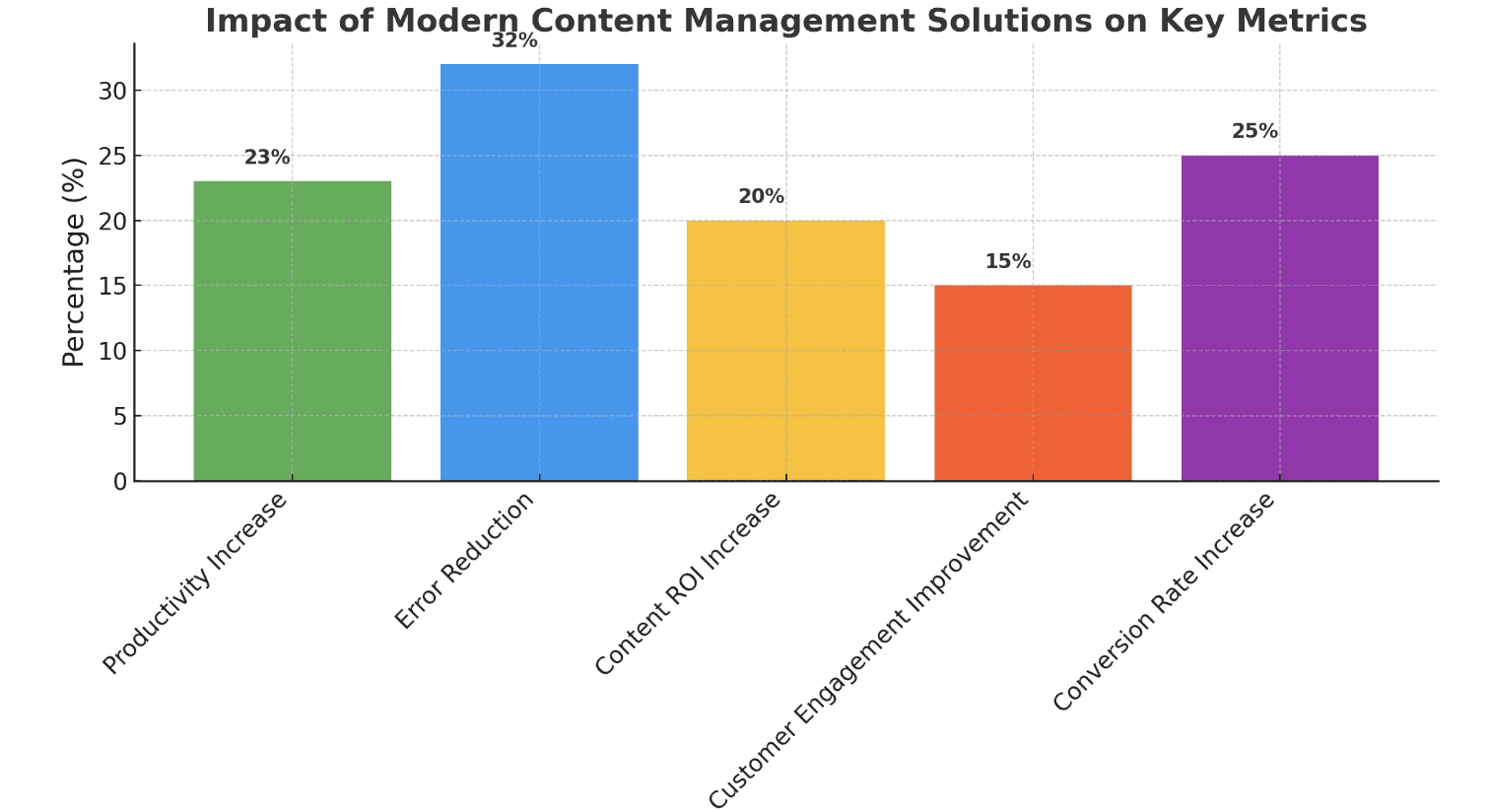The Evolution of Content Intelligence: Overcoming Challenges and Embracing Future Solutions.

The Birth of Content Intelligence.
In modern digital strategy, content management has become a key element of business success. With the exponential growth of data, effective management, analysis, and utilization of this data are more critical than ever.
This article discusses the challenges of content management over the years and the innovative solutions developed to address them. We will examine the revolutionary impact of technologies such as artificial intelligence, machine learning, and advanced analytics on content strategies. Furthermore, we will look to the future and consider the role of content intelligence in the coming years.
Coping with Initial Content Management Challenges.
The early days of digital content management were marked by significant challenges in organizing and retrieving information efficiently. As companies began to recognize the value of their digital assets, it became clear that structured data processing was necessary. The development of early Content Management Systems (CMS) was a milestone in overcoming these initial difficulties.
These pioneering systems provided frameworks for organizing, storing, and retrieving digital content, laying the groundwork for more advanced data management practices. **Research indicates that CMS implementation brought tangible benefits: organizations using these solutions saw a 23% increase in productivity and a 32% reduction in content-related
the transformative impact of structured content management on operational efficiency.
However, as enterprises grew, new challenges emerged, particularly related to data overload.
Overcoming Data Overload and Lack of Structured Data.
In the early days of the Internet, content management was relatively simple. Websites and digital content were static, and the focus was primarily on data collection. Analytical tools of the time, such as WebTrends (founded in 1993), provided basic metrics like page views and visits, offering insights into user behavior. Unfortunately, they lacked depth and actionable insights.
As digital content evolved and proliferated, companies faced the challenge of managing vast amounts of unstructured data and making sense of it. The development of Big Data technology provided a solution.
These initial challenges paved the way for more advanced analytical methods, laying the foundation for the data-driven revolution we witness today.
Breaking Down Data Silos and Fragmentation
As technology advanced and the number of tools for creating and managing content grew, many companies faced the problem of data silos. Information about content scattered across various platforms made it difficult to assess its effectiveness and led to fragmented marketing strategies.
Integrating analytical tools with the CMS became the solution to this problem. This integration provided a holistic view of content performance and audience engagement, breaking down data silos and ensuring a consistent view of content across the organization. The next step in content management evolution was automating manual processes and overcoming human limitations.
Automating Manual Processes and Overcoming Human Limitations.
With data integration in place, the focus shifted to automating manual processes and overcoming human limitations. Manual data analysis and content management processes were time-consuming and prone to human error.
The introduction of artificial intelligence and machine learning technologies to content management revolutionized data analysis. This solution reduced errors and significantly accelerated the process of adapting to market trends and consumer behavior.
A study by Forrester found that companies with integrated analytical and CMS solutions saw a 20% increase in content ROI and a 15% improvement in customer engagement metrics (source: Forrester Research, 2020).
Automation also contributed to expanding content analysis capabilities.
Expanding Content Analysis Capabilities.
Expanding content analysis capabilities was crucial in fully leveraging data potential. Advanced analytical tools allowed companies to delve deeper into user behaviors, customer preferences, and market trends.
This enabled them to deliver more personalized and relevant content, as content analysis became more advanced with technologies like natural language processing (NLP). This improved understanding of context and emotions expressed in content led to more precise marketing and communication strategies. As technology evolved, so did CMS solutions, which began to extend beyond traditional data storage and retrieval functions.
Evolving CMS Solutions Beyond Storage and Retrieval.
Initially, Content Management Systems (CMS) focused mainly on storing and retrieving information. However, as companies’ needs grew, these solutions had to evolve to meet increasingly complex content management requirements.
Modern CMS now offer advanced features such as:
- Data analytics
- Real-time content personalization
- Integration with various marketing tools
This comprehensive approach streamlines the entire content lifecycle management—from creation and publication to performance analysis and optimization.
The latest addition to CMS strategies is predictive analytics. It further enhances content effectiveness by enabling accurate trend prediction and a better understanding of customer behaviors.

Implementing Predictive Analytics in Content Strategy.
Combining predictive analytics with content creation strategies is an important step forward. By using historical data and machine learning algorithms, we can accurately predict how content will perform, how it will engage audiences, and what trends will emerge in the market.
Predictive content analysis tools, such as Google Analytics, Tableau, HubSpot, and IBM Watson Analytics, help analyze and interpret large amounts of data. According to a 2024 MarketsandMarkets report, the predictive analytics market is projected to reach $28.1 billion by 2026, growing at an average annual rate of 21.2%.
To fully leverage these capabilities, it is also essential to better understand the context of content and audience sentiments.
Enhanced Understanding of Context and Sentiments.
Understanding the context and emotions in content has become crucial for personalizing and optimizing content marketing strategies. Traditional management systems often struggled to interpret context and sentiments, making it difficult to accurately assess effectiveness and audience engagement. Advances in natural language processing (NLP) and sentiment analysis technologies have significantly improved systems’ ability to analyze texts.
These advancements allow for more precise analysis of content performance and audience engagement, enabling organizations to adjust strategies to user preferences in real time.
Key benefits include:
- More accurate assessment of content effectiveness.
- Better understanding of audience engagement.
- Ability to adjust strategies in real time.
Unifying Tools for Managing Fragmented Content.
The fragmentation of content management tools posed a significant challenge for many companies. Using different systems and platforms to manage various aspects of content led to gaps and inconsistencies in information management strategy. In the face of growing competition and dynamic market changes, unifying tools became necessary to ensure consistency and efficiency in content management processes.
Integrated CMS platforms that combine content creation, storage, analysis, and distribution functions enable companies to take a more holistic approach to information management.
According to the Adobe Digital Trends 2023 report, companies using artificial intelligence for real-time personalization saw a 25% increase in conversion rates. This content strategy flexibility becomes a key differentiator in competitive markets, allowing companies to stay ahead of trends and meet changing customer expectations.
As content analysis platforms become more powerful, the focus shifts to improving user accessibility and simplifying complex interfaces. A 2024 UX study by the Nielsen Norman Group found that 62% of users believe AI-based content management interfaces are more intuitive than traditional systems. The trend towards user-friendly design makes advanced content analysis tools accessible to a broader range of users, democratizing access to advanced analytical and management functions.

Simplifying Complex Interfaces and Improving Accessibility.
As content analysis platforms become more powerful, the focus shifts to improving user accessibility and simplifying complex interfaces. Complicated systems and difficult-to-use interfaces have been barriers to effectively leveraging technology. Simplifying interfaces and increasing tool intuitiveness allows diverse teams to manage content more effectively.
Modern CMS solutions and analytical tools increasingly focus on user experience (UX), enabling easier and more effective use of their capabilities. As content management technology continues to evolve, it is essential for companies to remain flexible and open to new solutions that will allow them to better manage their information resources and achieve better business outcomes.
Conclusion.
The evolution of content intelligence is a fascinating story marked by numerous challenges and innovative solutions. From the simple CMS of the past to today’s AI-based predictive analytics, this field has undergone an extraordinary transformation. Looking ahead, content experts identify five key trends that will shape this field in the coming years:
- Unified content lifecycle management platforms will become the norm, streamlining workflows and improving efficiency.
- Real-time data processing and analysis will enable faster responses to market changes and audience behaviors.
- User-friendly interfaces and improved accessibility will democratize access to advanced content analysis tools.
- The integration of artificial intelligence and machine learning will enhance the ability to understand and predict content performance and audience engagement.
The future of content intelligence promises not only more sophisticated tools and technologies but also a more nuanced approach to understanding and engaging with audiences.
